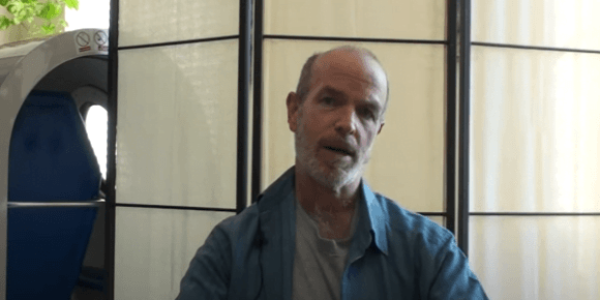At StemRx, we stand as a beacon of optimism for individuals navigating the challenges of Parkinson’s Treatment with Stem Cells Therapy. Our revolutionary stem cell therapy in India marks a significant stride forward in the quest for enhanced recovery. Parkinson’s, a complex neurological disorder, poses formidable obstacles to those it affects.
However, our innovative approach, fueled by the regenerative potential of stem cells, offers a promising avenue for rejuvenation and improved quality of life. With a firm belief in the power of science and compassion, we invite you to embark on a journey that explores the convergence of cutting-edge medical advancements and unwavering hope.
Our commitment to addressing Parkinson’s extends beyond the confines of traditional treatments. StemRx’s multidimensional approach encompasses a fusion of state-of-the-art stem cell techniques and a dedicated team of experts. With an intricate understanding of the intricacies of Parkinson’s and a passion for transforming lives, our team stands ready to guide each individual towards personalized recovery.
Through our comprehensive therapy, we aspire to unlock new dimensions of potential, resilience, and wellness. Join us as we redefine the narrative of Parkinson’s, offering a brighter horizon for those seeking a path to recovery.
Video Summary
In this touching video, Dr. Sharat Kotecha and his Aunt Linda express their heartfelt appreciation to Dr. Margin’s dedicated Stem Rx team.
Aunt Linda, affectionately known as the “Bionic Woman” due to her numerous surgeries and Parkinson’s disease, had been grappling with declining mobility and life quality.
Stem cell therapy, combined with oxygen and chelation therapies, medications, yoga, and physio, marked a turning point.
In a mere 15 days, her speech clarity improved, and she regained newfound independence in tasks like self-feeding and drinking.
Dr. Margin and the team are optimistic that sustained intensive physiotherapy over the coming months will unlock even more progress in Aunt Linda’s mobility.
Their hope is that her success story will inspire and pave the way for many more patients to embrace this transformative path.
Find more Patient Stories here to make an Informed Decision
Parkinson’s Treatment with Stem Cell Therapy
Table of Content
Parkinson’s disease is a progressive neurological disorder that primarily affects a person’s movement. It is characterized by symptoms such as tremors, rigidity, slowness of movement, and difficulty with balance. As the disease advances, it can lead to a significant impact on patients’ lives, affecting their ability to perform daily activities and diminishing their overall quality of life.
Conventional treatments for Parkinson’s disease, such as medications and deep brain stimulation, can help manage symptoms to some extent. However, they may not offer a complete solution and could be associated with various limitations and side effects.
In recent years, stem cell therapy has emerged as a promising avenue for the treatment of Parkinson’s disease. Stem cells are undifferentiated cells with the unique ability to develop into various cell types in the body. This remarkable characteristic makes them a potential tool for regenerating damaged or lost neurons in Parkinson’s disease patients.
Stem cell therapy involves the transplantation of these versatile cells into the brain to replace the dopamine-producing neurons that degenerate in Parkinson’s disease. Dopamine is a neurotransmitter that plays a crucial role in regulating movement and mood. The degeneration of dopamine-producing neurons is a key factor in the development of Parkinson’s symptoms.
Understanding Parkinson’s Disease
Parkinson’s disease is a complex and progressive neurological disorder that affects millions of people worldwide. It is characterized by a range of motor and non-motor symptoms that can significantly impact a person’s quality of life.
Causes:
The exact cause of Parkinson’s disease is still not fully understood, but it is believed to result from a combination of genetic and environmental factors. One of the hallmark features of the disease is the loss of dopamine-producing neurons in a specific region of the brain called the substantia nigra. Dopamine is a neurotransmitter responsible for transmitting signals that control movement and coordination. The loss of dopamine leads to the motor symptoms associated with Parkinson’s disease.
Symptoms:
Parkinson’s disease manifests in a variety of symptoms that can vary in severity from person to person. The primary motor symptoms include:
- Tremors: Involuntary shaking, often beginning in the hands or fingers and usually occurring at rest.
- Bradykinesia: Slowness of movement, making everyday tasks more time-consuming and challenging.
- Rigidity: Stiffness in muscles, which can lead to reduced flexibility and discomfort.
- Postural Instability: Difficulty maintaining balance, leading to an increased risk of falls.
In addition to these motor symptoms, Parkinson’s disease can also cause non-motor symptoms, which can often be equally debilitating:
- Depression and Anxiety: Mood changes are common, affecting a person’s emotional well-being.
- Cognitive Changes: Problems with memory, attention, and executive function can occur.
- Sleep Disturbances: Insomnia and other sleep-related issues can be prevalent.
- Speech and Swallowing Difficulties: Speaking and swallowing can become challenging as the disease progresses.
Challenges:
Managing Parkinson’s disease presents numerous challenges for patients and their caregivers. As the disease is progressive, symptoms tend to worsen over time, requiring adjustments to treatment plans and lifestyle changes. The unpredictable nature of symptoms, such as “off” periods when medication effectiveness wears off, can disrupt daily activities and social interactions. This can lead to feelings of frustration, isolation, and a diminished sense of independence.
Furthermore, the diverse range of symptoms makes diagnosis and treatment complex. Healthcare providers often need to tailor treatment plans to address each patient’s specific needs. This can involve a combination of medications, physical therapy, occupational therapy, speech therapy, and more.
The Science Behind Stem Cell Therapy for Parkinson’s
Stem cell therapy has garnered significant attention in the context of treating Parkinson’s disease, with a growing body of research and studies supporting its potential efficacy. This groundbreaking approach seeks to harness the regenerative power of stem cells to restore damaged neurons, offering new hope to patients. Let’s delve into the science behind this therapy, as well as its treatment procedure, benefits, and associated risks.
Research and Studies:
Numerous preclinical studies and early-stage clinical trials have demonstrated the potential of stem cell therapy for Parkinson’s disease. These studies have shown promising results in terms of neuronal regeneration, improved motor function, and enhanced quality of life for patients. While further research is needed to establish its long-term effects and optimal protocols, the initial findings are encouraging.
Successful Cases and Patient Testimonials:
Several cases have showcased the positive impact of stem cell therapy on Parkinson’s patients. Individuals who have undergone the treatment have reported improvements in motor skills, reduced tremors, enhanced mobility, and a reduction in medication dependency. While each patient’s response to treatment can vary, these success stories underscore the potential of stem cell therapy to significantly enhance the lives of those with Parkinson’s disease.
Treatment Procedure and Process:
- Preparation: Before treatment, patients undergo a thorough evaluation to assess their suitability for stem cell therapy. This involves medical history, neurological examinations, and imaging studies.
- Stem Cell Collection: Stem cells can be obtained from various sources, including the patient’s own body (autologous) or from donors (allogeneic). Common sources include bone marrow or adipose tissue.
- Processing and Culturing: Once collected, the stem cells are processed and cultured to increase their numbers and enhance their therapeutic potential.
- Administration: The stem cells are then carefully administered into the targeted area of the brain, often guided by imaging techniques to ensure precision.
- Monitoring and Follow-Up: After treatment, patients are closely monitored to assess their progress. This may involve tracking motor improvements, changes in symptoms, and potential side effects.
Benefits of Parkinson’s Treatment with Stem Cells:
Stem cell therapy holds several potential benefits for Parkinson’s patients, including:
- Restoration of dopamine-producing neurons
- Improved motor function and mobility
- Reduction in motor symptoms such as tremors and rigidity
- Potential reduction in medication dosages
- Enhanced overall quality of life
Risks and Uncertainties:
While the potential benefits are promising, it’s important to acknowledge the associated risks and uncertainties of stem cell therapy:
- Possibility of immune rejection
Unpredictable cell behavior or unintended cell growth
Ethical considerations regarding cell sources and manipulation
Stem cell therapy for Parkinson’s disease represents a promising frontier in medical research and treatment. The science behind it, coupled with successful cases and ongoing studies, indicates its potential to revolutionize the management of this debilitating condition. However, careful consideration of treatment options, thorough consultation with medical professionals, and an awareness of both benefits and risks are essential steps for patients and their families.
Why Choose StemRx for Parkinson’s Treatment with Stem Cell Therapy in India
When considering Parkinson’s treatment options, StemRx stands out as a premier choice for those seeking advanced and effective care through stem cell therapy in India. StemRx has established itself as a leader in the field, offering a range of compelling reasons to consider their expertise and services.
Cutting-edge Research and Expertise:
StemRx boasts a team of highly skilled medical professionals, researchers, and specialists who are at the forefront of stem cell therapy advancements. Their deep understanding of Parkinson’s disease and innovative approaches to treatment reflect their commitment to delivering the best possible outcomes.
Specialization in Neurological Disorders:
StemRx’s specialization in neurological disorders, including Parkinson’s disease, sets them apart. Their focused expertise allows for tailored treatment strategies that address the unique challenges posed by these conditions, ensuring that patients receive comprehensive and targeted care.
State-of-the-art Facilities:
Equipped with state-of-the-art facilities and cutting-edge technology, StemRx provides a conducive environment for the administration of stem cell therapy. This commitment to infrastructure enhances the precision and effectiveness of treatments, ultimately leading to improved patient experiences and outcomes.
Comprehensive Treatment Plans:
StemRx takes a holistic approach to treatment. Their personalized treatment plans encompass a range of therapies, rehabilitation strategies, and support services that cater to each patient’s specific needs. This comprehensive approach goes beyond stem cell therapy, ensuring a well-rounded and tailored healing journey.
Proven Success and Patient Testimonials:
StemRx’s success stories and patient testimonials underscore their impact. Countless individuals who have undergone treatment at StemRx have reported significant improvements in their symptoms, quality of life, and overall well-being. These positive outcomes reflect StemRx’s dedication to delivering tangible results.
Ethical and Transparent Practices:
StemRx upholds the highest ethical standards in its practices, ensuring that patients and their families are provided with transparent information and a clear understanding of the treatment process. This commitment to ethical conduct contributes to a sense of trust and confidence among patients.
Global Recognition and Collaborations:
StemRx’s reputation extends beyond India’s borders, with collaborations and partnerships with leading institutions and experts worldwide. Their global recognition further validates their commitment to excellence and innovation in the field of stem cell therapy.
Final Thoughts
As we stand at the precipice of a new era in Parkinson’s treatment, StemRx’s commitment to progress is unwavering. Our approach isn’t confined to conventional boundaries; it bridges the gap between cutting-edge medical science and the deeply personal journey of each patient. We understand that Parkinson’s is more than a collection of symptoms; it’s a journey that affects individuals and their loved ones on profound levels.
With stem cell therapy as our cornerstone, we’re not merely aiming to alleviate symptoms; we’re aiming to transform lives. The remarkable potential of stem cells offers a glimpse into the future of regenerative medicine. Our dedicated team, armed with expertise and compassion, guides patients towards a more promising tomorrow.
StemRx envisions a future where Parkinson’s is met with resilience, where progress defies limitations, and where hope triumphs over adversity. As we move forward, we invite you to join us on this transformative journey, where science and human spirit unite to illuminate the path to recovery. Together, we’re shaping a narrative of strength, healing, and renewed possibilities, one stem cell at a time.
Book Appointment
Embark on a journey of renewed hope with StemRx’s Parkinson’s treatment in India. Explore the potential of stem cell therapy, guided by a compassionate team. Together, let’s redefine recovery and embrace a future of possibilities. Contact us today to embark on your path to transformative healing.






